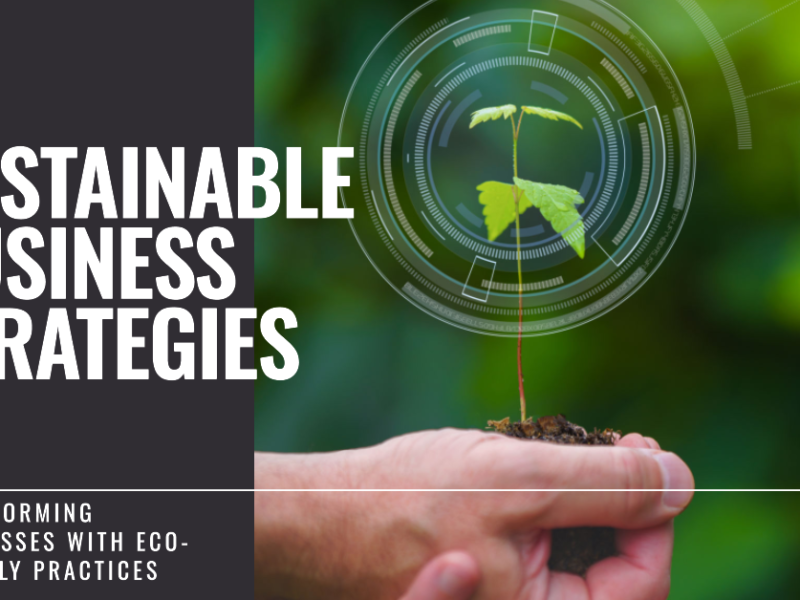Implementing Sustainable Practices: Eco-Friendly Solutions for Modern Businesses
Introduction:
In recent years, the urgency of addressing environmental challenges has become increasingly apparent as the consequences of climate change, pollution, and resource depletion continue to manifest globally. The scientific consensus on the impact of human activities on the planet’s ecosystems has spurred a wave of environmental consciousness among individuals, communities, and governments worldwide.
One of the most significant shifts resulting from this heightened awareness is the changing consumer behavior. Today’s consumers are more informed and conscientious about the environmental implications of their purchasing decisions. They are actively seeking products and services that align with their values of sustainability and environmental responsibility. Consequently, businesses are facing mounting pressure to adapt their practices to meet these evolving consumer preferences.
The importance of implementing sustainable practices in modern businesses cannot be overstated. Beyond meeting consumer demand, there are compelling reasons for companies to embrace sustainability as a core principle of their operations.
First and foremost, adopting sustainable practices is a moral imperative. As stewards of the planet, businesses have a responsibility to minimize their environmental footprint and mitigate their impact on natural resources. By reducing carbon emissions, conserving water, and minimizing waste generation, companies can contribute to the preservation of ecosystems and biodiversity, safeguarding the planet for future generations.
Moreover, embracing sustainability is not just a matter of ethics; it also makes good business sense. Sustainable practices can lead to significant cost savings and operational efficiencies for businesses. For example, investing in energy-efficient technologies can lower utility bills and reduce long-term operating expenses. Similarly, implementing waste reduction strategies can minimize disposal costs and improve resource utilization. By optimizing their use of resources and minimizing waste, companies can enhance their competitiveness and resilience in a rapidly changing business landscape.
Furthermore, sustainability has emerged as a key differentiator in today’s market-driven economy. Businesses that demonstrate a commitment to environmental responsibility can gain a competitive advantage by attracting environmentally conscious consumers and investors. Studies have shown that consumers are increasingly willing to pay a premium for products and services from companies with strong environmental credentials. By aligning their brand with sustainability, businesses can enhance their reputation, build brand loyalty, and drive customer engagement.
In addition to consumer demand, regulatory pressures are also driving businesses to adopt sustainable practices. Governments around the world are enacting increasingly stringent environmental regulations aimed at reducing greenhouse gas emissions, promoting renewable energy, and protecting natural resources. Companies that fail to comply with these regulations risk facing fines, legal liabilities, and reputational damage. By proactively embracing sustainability, businesses can position themselves to navigate regulatory challenges effectively and avoid costly penalties.
So, what are some eco-friendly solutions that companies can adopt to reduce their environmental impact? There is a wide range of strategies and initiatives that businesses can implement to promote sustainability across their operations.
Energy efficiency measures, such as upgrading to LED lighting, installing energy-efficient appliances, and optimizing heating, ventilation, and air conditioning (HVAC) systems, can significantly reduce energy consumption and greenhouse gas emissions.
Investing in renewable energy sources, such as solar, wind, and hydroelectric power, can further reduce reliance on fossil fuels and promote clean, renewable energy production.
Waste reduction and recycling programs can help minimize the amount of waste sent to landfills and conserve valuable resources. Companies can implement strategies to reduce packaging waste, optimize production processes to minimize material waste, and promote the use of recyclable materials in their products and packaging.
Supply chain sustainability is another critical area for businesses to focus on. By partnering with suppliers that adhere to sustainable practices and ethical labor standards, companies can promote responsible sourcing and minimize the environmental and social impacts of their operations.
Water conservation measures, such as implementing water-efficient technologies, optimizing water use in manufacturing processes, and investing in water recycling and reuse systems, can help companies reduce their water footprint and preserve this precious resource.
Businesses can develop and market eco-friendly products and services that meet the growing demand for sustainable alternatives. This may involve using environmentally friendly materials, designing products with durability and recyclability in mind, and educating consumers about the environmental benefits of their offerings.
Implementing sustainable practices is not only essential for addressing the pressing environmental challenges facing our planet but also for ensuring the long-term viability and success of businesses in a rapidly changing world. By embracing sustainability as a core principle of their operations, companies can meet consumer demand, drive cost savings, enhance their competitive advantage, and contribute to a more sustainable future for all.
Why Sustainability Matters:
Sustainability is no longer just a buzzword; it’s a business imperative. Consumers are becoming more environmentally conscious and are choosing to support businesses that share their values. In fact, a recent survey found that 66% of consumers are willing to pay more for sustainable brands. Additionally, investors and stakeholders are placing greater emphasis on environmental, social, and governance (ESG) factors when evaluating companies.
READ ALSO: Innovative Marketing Strategies for Small Businesses
Moreover, adopting sustainable practices can also lead to cost savings and operational efficiencies for businesses. By reducing energy consumption, waste generation, and water usage, companies can lower their utility bills and improve their bottom line. Additionally, sustainable practices can enhance brand reputation, attract top talent, and foster innovation.
Eco-Friendly Solutions for Businesses:
- Energy Efficiency:
Implementing energy-efficient practices and technologies can significantly reduce a business’s carbon footprint. This includes upgrading to LED lighting, installing smart thermostats, and investing in energy-efficient appliances and equipment.
Companies can also explore renewable energy sources such as solar or wind power to power their operations. By generating clean energy onsite or purchasing renewable energy credits, businesses can reduce their reliance on fossil fuels and lower their greenhouse gas emissions.
- Waste Reduction:
Businesses can minimize waste generation by implementing recycling and composting programs, reducing packaging materials, and opting for reusable or recyclable products.
Adopting a circular economy approach, where products and materials are reused, refurbished, or recycled at the end of their life cycle, can also help businesses minimize waste and conserve resources.
- Sustainable Supply Chain:
Assessing and improving the sustainability of the supply chain is essential for businesses looking to reduce their environmental impact. This includes sourcing materials and ingredients from ethical and eco-friendly suppliers, minimizing transportation emissions, and promoting fair labor practices.
Companies can also work with suppliers to reduce packaging waste, optimize inventory management, and implement sustainable farming and harvesting practices.
- Water Conservation:
Conserving water is another critical aspect of sustainable business practices. Companies can invest in water-efficient fixtures and appliances, implement water recycling and reuse systems, and adopt landscaping practices that minimize water usage.
Additionally, businesses can conduct water audits to identify areas of inefficiency and implement conservation measures to reduce water consumption.
- Eco-Friendly Products and Services:
Offering eco-friendly products and services can help businesses meet the growing demand for sustainable options. This includes using environmentally friendly materials, reducing the carbon footprint of products through lifecycle assessments, and designing products with end-of-life disposal in mind.
Companies can also educate consumers about the environmental benefits of their products and encourage sustainable consumption habits.
Case Studies:
- Patagonia:
Outdoor clothing and gear company Patagonia is known for its commitment to environmental sustainability. The company has implemented numerous eco-friendly initiatives, including using recycled materials in its products, investing in renewable energy, and supporting environmental advocacy organizations.
Patagonia’s transparent approach to sustainability has helped build trust with consumers and differentiate the brand in a competitive market.
- Interface:
Interface, a global flooring manufacturer, has set ambitious sustainability goals, including achieving carbon neutrality and zero waste by 2020. The company has implemented innovative solutions such as closed-loop recycling and biomimicry-inspired design to minimize its environmental impact.
Interface’s sustainability efforts have not only reduced its environmental footprint but have also driven innovation and cost savings within the company.
Conclusion:
In conclusion, implementing sustainable practices is essential for modern businesses looking to thrive in an increasingly eco-conscious world. By reducing energy consumption, minimizing waste generation, optimizing the supply chain, conserving water, and offering eco-friendly products and services, companies can lower their environmental impact, attract environmentally conscious consumers, and drive long-term profitability. Moreover, by leading by example, businesses can inspire others to follow suit and contribute to a more sustainable future for generations to come.






